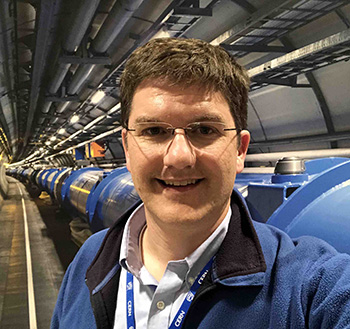Campus News
UC Santa Cruz leads DOE program to train computational high-energy physicists
The Santa Cruz Institute for Particle Physics (SCIPP) at UC Santa Cruz is leading a consortium of western research universities and national laboratories in a new program to train the next generation of computational high-energy physicists.

The Santa Cruz Institute for Particle Physics (SCIPP) at UC Santa Cruz is leading a consortium of western research universities and national laboratories in a new program to train the next generation of computational high-energy physicists. Funded by a $3.2 million grant from the U.S. Department of Energy, the program addresses a critical need for advanced training in computational aspects of high-energy physics.
As physics and astrophysics experiments collect more data for high-precision measurements, researchers have come to depend on large-scale computing infrastructure and high-performance computing algorithms. Many collaborative research programs have dedicated experts in advanced computing technologies who are also experts in particle physics.
“Future high energy physics discoveries will require large accurate simulations and efficient collaborative software,” said Regina Rameika, associate director of science for high energy physics at DOE. “These traineeships will educate the scientists and engineers necessary to design, develop, deploy, and maintain the software and computing infrastructure essential for the future of high energy physics.”
The new Western Advanced Training for Computational High-Energy Physics (WATCHEP) program brings together six public universities and three national laboratories to create a tailored modular curriculum and offer intensive research opportunities during a two-year training period for graduate students. The specific training areas are hardware-software co-design, collaborative software infrastructure, and high-performance software and algorithms.
“The students from this program will become ‘computing ambassadors’ and take their cutting-edge expertise into the large science collaborations that are dealing with enormous datasets and computational complexity,” said WATCHEP principal investigator Jason Nielsen, director of SCIPP and professor of physics at UCSC. “A unique aspect of the program is additional training in communications, project leadership, and responsible conduct.”
The WATCHEP institutes joining UC Santa Cruz in this program are UC Berkeley, UC Irvine, UC San Diego, Oregon State University, University of Washington, Brookhaven National Lab, Fermilab, and Lawrence Berkeley Lab.
The project team has expertise in a wide range of computing topics. Some members have developed novel curricular materials for diverse graduate student cohorts in computing, others have led large computing projects for DOE science experiments, and all are currently engaged in relevant research and development projects that lend themselves to this initiative. Through the team members, students will have access to state-of-the-art computing facilities with the latest hardware accelerators and storage systems.
The training program will complement existing graduate programs by focusing on advanced topics and opportunities. An annual summer school will provide an opportunity for activities to strengthen relationships within the cohort.
“By the end of the five-year program, a new cohort of high-energy physics computing ambassadors will be ready to contribute to the science community and the DOE scientific workforce,” Nielsen said.